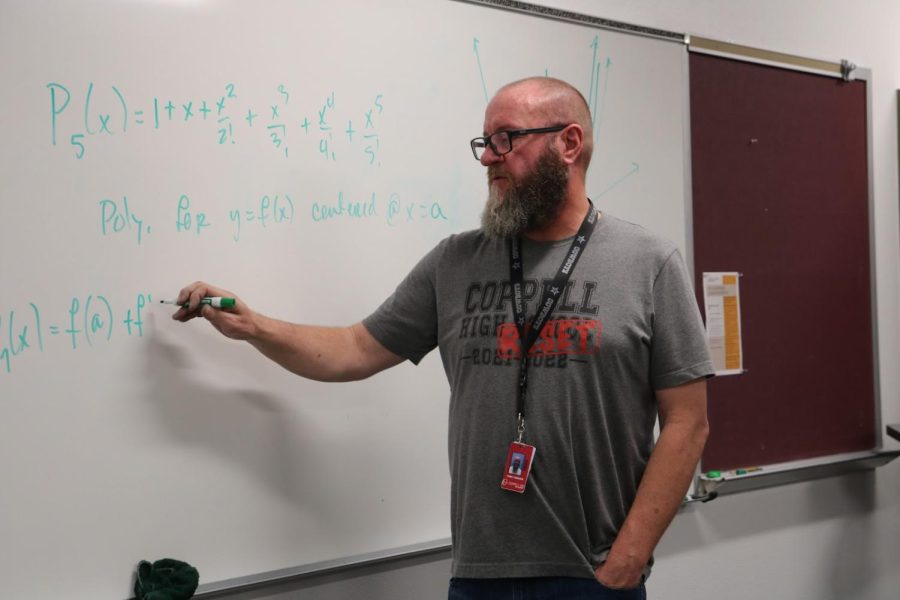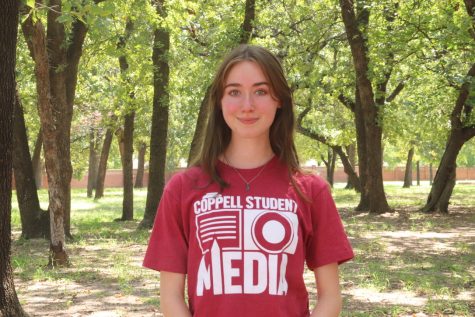Osborne’s step by step approach to teaching calculus
Coppell High School AP calculus BC teacher Terry Osborne teaches factorials during third period on Thursday. Osborne is a new teacher at Coppell, but is already known for his unique sayings and dedication.
April 13, 2022
What is harder than brain surgery or rocket science?
To AP students, their calculus classes might feel harder. To Coppell High School AP calculus AB and BC teacher Terry Osborne, making calculus easy for high school students is the goal.
After graduating from the University of Texas at El Paso in 1996, Osborne entered the teaching field as a calculus teacher.
Starting off in Mountain View High School in El Paso in 1996, Osborne moved on to CHS in 2000 and taught for five years before moving to Flower Mound Marcus for the next sixteen years. Osborne returned to CHS in 2021 to teach AP calculus AB and BC.
Osborne comes from a family of teachers and was inspired to enter the teaching field after tutoring in college, when he realized he enjoyed teaching. Since starting his second time teaching at Coppell, Osborne has become a favorite teacher among students.
“He’s truly a brilliant teacher,” CHS calculus teacher Ian VanderSchee said. “He has an excellent relationship with his students, and he knows more about calculus BC than anybody else I’ve ever known or worked with.”
Since becoming a teacher, Osborne has been teaching the same caliber of students: often AP juniors and seniors.
“It’s a challenge to teach high schoolers and get them to understand calculus,” Osborne said. “The reward is when they do understand.”
Osborne’s sayings in class include ‘brain science’ and ‘rocket surgery,’ a play on ‘rocket science’ and ‘brain surgery.’ His “sayings” help catch students’ attention and recall the content better later on. They have become a beloved part of his class.
“I love how [Osborne] words his lectures,” CHS junior Mytri Nair said. “His sayings are a part of his personality, and a part of class that I love.”
Osborne’s sayings are one approach to helping students understand calculus better.
“Students remember my sayings,” Osborne said. “Though I do hope they remember what I was teaching in addition to my sayings.”
Osborne’s teaching style focuses on giving students rudimentary knowledge and then allowing them to apply their knowledge to understand more complex concepts themselves.
“I hardly ever just give my students the formula for a complicated idea,” Osborne said. “Know the basic concepts, and know them well enough to apply them to more complicated situations.”
Students often derive formulas for more advanced concepts on their own with Osborne’s guidance by applying formulas and rules from more primary concepts that they have already mastered. Through this approach, students can better understand the workings of calculus and be prepared to face more unique problems rather than memorizing the solutions.
Another of Osborne’s approaches to his classes aims to teach students what they need to know the most, and then give them enough time to finish their homework rather than adhering to a strict lesson plan.
“Typically, teachers will go through notes in a class, and then give students just a few minutes to catch up on homework,” Coppell junior Anusha Patel said. “Osborne always goes over homework in class so we’re not confused for next time. He focuses on students being independent, but is always open for any questions.”
To some students, math can be an intimidating subject, making it harder for them to reach out to their teacher and ask questions; however, Osborne’s approach of breaking complicated problems into easier concepts and sketching graphs to visualize the material helps students overcome challenges and allows students to approach him easier.
“He’s an extremely approachable teacher,” Patel said. “Even if he’s working, he’ll take out a piece of paper and explain to you step by step how to solve a problem.”
Osborne’s style is valuable to more than just his students. As an AP grader with 17 years of experience, Osborne is valued for his extensive knowledge and unique understanding of advanced calculus.
“He’s always able to provide a new approach to a problem that I haven’t thought of yet,” VanderSchee said. “If I ever need an additional perspective for something, I always go to him.”
As the academic year nears an end, his students prepare to take their AP exams, and move on to higher level calculus courses or graduate.
“I want my students to gain a love of learning from my class,” Osborne said. “I don’t want them to give up on the question. I want them to learn how to figure things out, and if they ever need me next year, I want them to know they can always email me.”
Follow Yaamini (@yjois12) and @CHSCampusNews.











